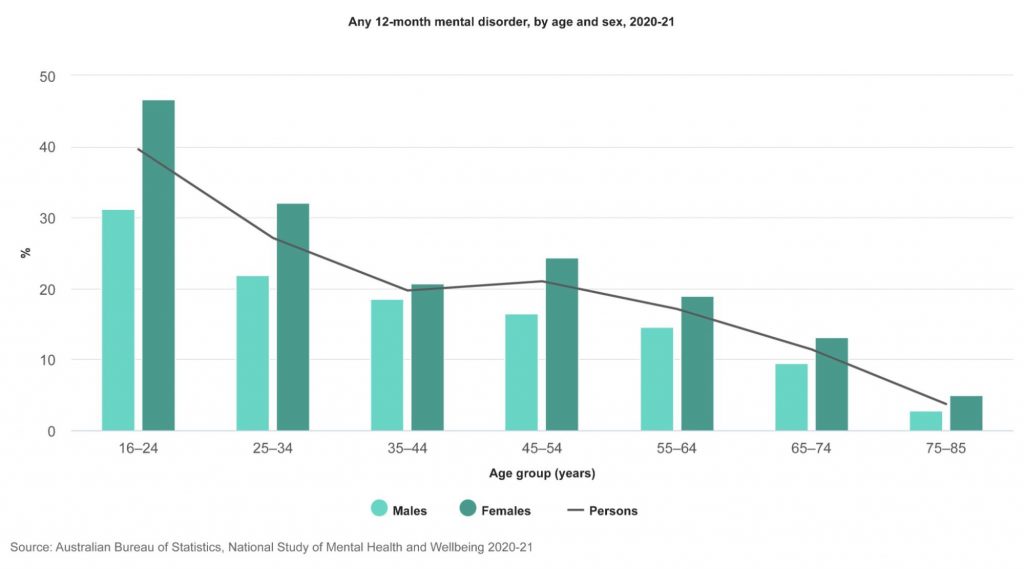In the wake of R U OK day and with October being National Mental Health Month, I’m reminded of the need to rethink our society’s approach to tackling mental health. And, it all starts with multidisciplinary teamwork.
Australia is an advancing society with good access to medical care, meaning that we’re enjoying higher life expectancy rates each year. While this is welcome news, it also means that we have a growing number of older people in our society. The Australian Institute of Health and Welfare graph below indicates how the older population will grow over the next 75 years.
Australia’s mental health statistics
According to the World Health Organization (WHO), mental health and wellbeing is a key component of overall health and wellbeing. WHO defines mental health as ‘a state of wellbeing that enables people to cope with the stresses of life, realise their abilities, learn well and work well, and contribute to their community.’ Mental health is crucial to personal, community and socio-economic development.
The National Study of Mental Health and Wellbeing conducted in 2021 by the Australian Bureau of Statistics (ABS) found that an estimated 1 in 5 (21.4%) Australians aged 16–85 experienced a mental disorder in the previous 12 months. This includes a range of illnesses including anxiety disorders, affective disorders, psychotic disorders and substance use disorders. However, a person does not need to meet the criteria for a mental illness or mental disorder to be negatively affected by their mental health – it also impacts their families and carers. Therefore, the true toll of mental health on our community is underreported.

Mental health is not just a young person’s problem
It’s commonly thought that young adults and adolescents are the most common age group to face mental health issues. However, we now know that many older people experience mental disorders. Despite growing awareness of the debilitating effects of mental illness on a person’s day-to-day functioning and independence, adults aged 65 years and over continue to under-utilise mental health services compared to younger adults. This has also led to underreporting of mental disorders in older age groups, as shown in the latest ABS data below.

As our population ages, providing appropriate and effective mental healthcare for older Australians needs a special focus. Research published by The Australian Institute of Family Studies has identified a range of factors that may act as barriers to appropriate mental healthcare for older adults, including:
- a lack of services specialising in mental healthcare for older adults.
- the prioritisation of physical healthcare above mental healthcare.
- poor mental health education, including the assumption that mental health is a normal part of the ageing process.
- the stigma associated with mental illness.
Untreated mental ill health in older age can lead to a deterioration in overall health, increased hospital admissions and an earlier transition to residential aged care facilities.
The need for multidisciplinary healthcare teams
At any stage of life, the needs of someone with a mental health issue can rarely be met with one person alone. It’s why, over the years, we’ve moved from mental health institutions to coordinated community care that focuses on ‘person-centred care’. The philosophy of person-centeredness aims to provide mental healthcare through a multidisciplinary team. Multidisciplinary team care consists of at least one patient and multiple health professionals from several different disciplines. Health professionals who participate in a multidisciplinary team, care, collaborate and communicate together in order to address as many aspects of a patient’s care as possible.
What kind of roles play a part in mental health treatment?
People with mental health issues, whether it’s a short or long-term condition, often have a wide range of complex needs that may be social, environmental, physical, and psychological. To create an integrated and holistic care plan, along with doctors and nurses, patients should have access to a range of healthcare practitioners. They may include clinical psychologists, registered psychologists, social workers, counsellors, occupational therapists, physiotherapists and other allied health professionals with experience in assessing, managing and treating people with mental illness. Allied health professionals provide a range of diagnostic, technical, therapeutic, and support services to help treat mental health.
Hiring for healthy multidisciplinary healthcare teams
In order for a multidisciplinary team to function well, it’s important to clearly define roles, outcomes, and modes of delivery. This starts in the recruitment process, which Limelight People supports end-to-end, from initial client consultation right through to talent placement and relocation. However, it’s also important for organisations to create comprehensive policies, procedures, systems and protocols to make multidisciplinary teams effective.
Outside of qualifications and experience, my team look for the following skills when shortlisting candidates for a multidisciplinary healthcare team:
- communication.
- organisation and coordination.
- respect and humility.
- honesty and transparency.
- clear implementation strategies.
When multidisciplinary teams work effectively, both patients and practitioners benefit from increased satisfaction and happiness, improved time management, efficient use of resources, and improved health outcomes.
Need help building out your multidisciplinary health team?
With a large network, Limelight People are specialists in recruiting for the healthcare industry and have placed talented and passionate people in teams all over Australia.
If you’re ready to discuss your organisation or hospital’s recruitment needs, please email our Mental Health recruitment specialists at info@limelightppl.com.au for a confidential discussion.







